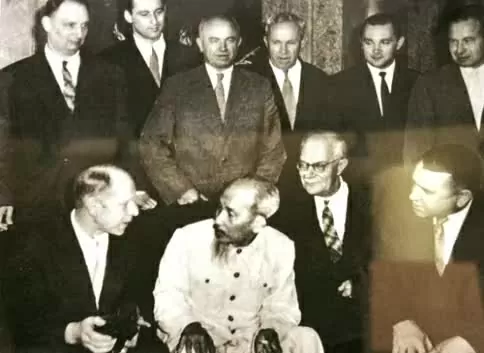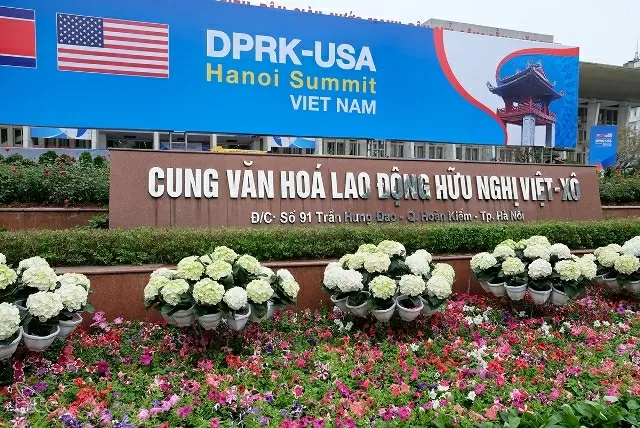
Ho Chi Minh’s diplomatic culture: A guiding light in foreign affairs
Latest
 |
| President Ho Chi Minh received a delegation of Soviet experts who came to provide professional assistance to the State Planning Commission in Hanoi, March 22, 1960. (Photo courtesy of the State Planning Commission. Source: tuyengiao.vn) |
President Ho Chi Minh - a genius leader, a great teacher of the Vietnamese revolution, a national liberation hero, a world cultural great man, a model international communist, and a close friend to peace-loving and socially progressive peoples around the world.
Promoting the values of Ho Chi Minh's diplomacy is not only a reminder of a glorious era, but also a journey to nurture the cultural character of the new generation—so that they may possess the wisdom and strength to reach out to the world.
With steadfast principles, adapt to all changes
What is the most distinctive feature of President Ho Chi Minh's diplomatic culture, and what significance does it hold for our country's current foreign affairs?
In my opinion, the most distinctive feature of President Ho Chi Minh's diplomatic culture is the seamless integration of national cultural identity with a profound humanitarian spirit and keen intellect in international dialogue. He was not only an exceptional leader but also a great cultural figure, who consistently upheld the values of sincerity, humility, and altruism in his relations with friends around the world.
His diplomatic style of "being steadfast in principles, while adapting to all changes" has become a hallmark of Vietnamese diplomacy: gentle yet resolute, peace-loving yet never submissive—building trust through loyalty, and paving the way for integration through moral values.
President Ho Chi Minh once said, “If you want others to help you, you must first help yourself. If you want others to respect you, you must first respect yourself.” This saying is not only a principle for living but also a guiding motto for modern Vietnamese diplomacy. Thanks to this cultural foundation, whether in times of war or peace, Vietnam has always had sincere friends and has consistently been recognized by the international community as a peace-loving, courageous, and principled nation—ready to shoulder global responsibilities.
Today, in a world of constant change, Ho Chi Minh's diplomatic culture remains a guiding light for the foreign affairs of our Party and State. It serves as a compass, helping us safeguard independence and sovereignty while expanding international cooperation and elevating the country's stature on the global stage.
President Ho Chi Minh is loved and respected around the world not only for his ideology, but also for his deeply humane way of interacting with others. Could you share your assessment of his humanity in diplomacy and the lessons it offers to modern diplomats?
President Ho Chi Minh was a living embodiment of humane diplomacy—where every action and word reflected profound patriotism, compassion for humanity, and a deep yearning for lasting peace. In dealing with international friends, he did not rely on reason alone; he spoke from the heart—a heart that bore the suffering of a nation yet remained full of tolerance, goodwill, and hope.
His humanity in diplomacy was most clearly expressed through his ability to understand and respect the other party—whether a head of state, a Western journalist, or an ordinary citizen. He consistently sought common ground between cultures and peoples, building bridges of dialogue founded on mutual respect.
He once said: “We are not against the French people, not against the French soldiers forced to fight in Vietnam. We are only against colonialism.” This was not merely a political message—it was a profound humanistic vision that transcended hatred, expressing a desire to build a fairer and more compassionate world.
The greatest lesson modern diplomats can draw from Ho Chi Minh's style is that one must first learn how to be a human being before becoming an instrument of policy. A diplomat is not merely someone who conveys national positions, but also someone who upholds cultural dignity—a messenger of trust and mutual understanding.
In today’s uncertain world, diplomacy demands not only strategic acumen but also warm hearts—the ability to listen, empathize, and lead with goodwill.
President Ho Chi Minh’s humane diplomatic ideology and style are not only a treasured legacy of the nation, but also a powerful reminder of the soft power of compassion—a quiet force capable of transcending barriers and reaching the most enduring values in international relations.
Enhancing Vietnam’s position in the new era
In your opinion, how has Ho Chi Minh’s diplomatic culture contributed to enhancing Vietnam’s position and prestige on the international stage?
Ho Chi Minh’s diplomatic culture has made a profound and lasting contribution to elevating Vietnam’s international position—not just through strategic thinking, but through the quality of cultural conduct, moral integrity, and deeply humanistic values.
It is a diplomacy grounded in self-respect and mutual respect; one that is flexible yet steadfast, unafraid to defend what is right, while always placing peace and cooperation as its highest goals.
In 1955, when leading the Vietnamese delegation to the Bandung Conference in Indonesia, President Ho Chi Minh not only represented Vietnam but also became a unifying voice for the Asian-African national liberation movement. He called on nations to unite in the pursuit of independence, freedom, and peace. His calm demeanor, sincere words, and approachable nature left a deep impression on world leaders, further affirming Vietnam’s international prestige.
 |
| The Press Center for the DPRK-USA Summit 2019 in Hanoi. (Photo: vietnamtourism.gov.vn) |
Today, it is the foundation of Ho Chi Minh’s diplomatic culture that has enabled Vietnam to successfully shape its image as “a friend, a reliable partner, and a responsible member of the international community.”
This is clearly reflected in Vietnam’s two terms as a non-permanent member of the United Nations Security Council, during which it earned high international regard; its role as host of major global events such as APEC 2017 and the DPRK - USA Summit 2019; and, most recently, its proactive initiatives to build trust in the region and contribute to maintaining world peace.

















